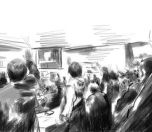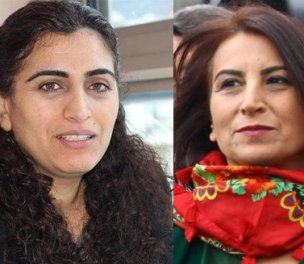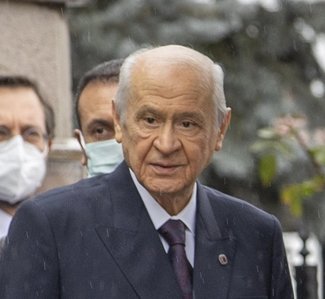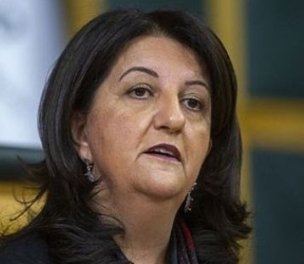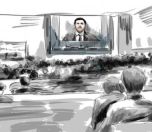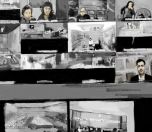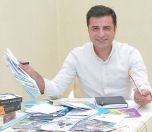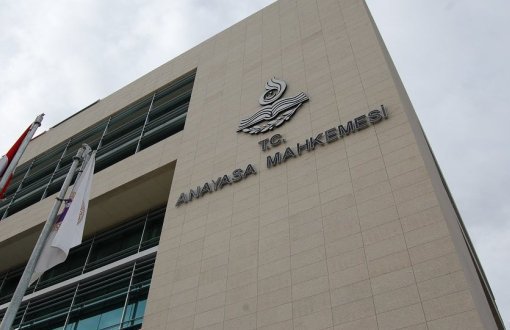People demonstrating in the eastern Van province in October 2014.
Click to read the article in Turkish
The Ankara 22nd Heavy Penal Court accepted the indictment into the 2014 "Kobanê protests," which claimed more than 40 lives in Kurdish majority provinces.
The protests began in late September when ISIS launched an offensive to take over Kobanê, a Kurdish town in northern Syria. Incidents between different protesting groups and the police response to protesters turned violent from October 6.
While the government has accused the Peoples' Democratic Party (HDP) of orchestrating the protests and held it responsible for the losses, the party says most of the killed were its supporters and the incidents have not been effectively investigated.
Prosecutors requested 38 aggravated life sentences for 108 defendants, 27 of whom are currently in pre-trial detention. Six people were released on probation and 75 have arrest warrants against them.
Senior politicians from the HDP, including its former co-chair Selahattin Demirtaş, are among the defendants.
The indictment was prepared on December 30, eight days after the Grand Chamber of the European Court of Human Rights (ECtHR) ordered the immediate release of Demirtaş, who has been behind bars since November 2016.
The indictment demands the penalization of all suspects on charges of "disrupting the unity and territorial integrity of the state", "killing for 37 times, "attempted killing for 31 times", "burning the flag" and "violating the Law on Protecting Atatürk."
The indictment says the defendants organized "terror incidents" and gave messages to "the masses supporting the Kurdistan Workers' Party/Kurdish Communities Union (PKK/KCK) terrorist organization" with the intention of spreading the incidents throught the country.
All the defendants should be considered as executives of the PKK/KCK, according to the indictment.
About Kobanê protestsIn September 2014, ISIS, which controlled a large territory in Syria at the time, launched an offensive to Kobanê, a Kurdish town in northern Syria, near the country's border with Turkey. In late September, a group of people went to Suruç, a town neigboring Kobanê in the predominantly Kurdish city of Urfa, and attempted to cross the border. Police prevented them, using tear gas and rubber bullets. Pictures allegedly showing ISIS militia crossing into Syria were published on the same days. Also, President Recep Tayyip Erdoğan made statements indicating that they equated the PKK with ISIS. While the wounded coming from Kobanê were kept waiting on the border, the wounded from ISIS were treated at hospitals. Several news reports were reported in the press, saying "Kobanê fell." These news reports were denied every time. After the HDP made a call to take to the streets against a possible massacre in Kobanê, thousands of people protested in Kurdish-majority provinces as well as Ankara and İstanbul. While left parties also supported these protests, deaths also occurred with the onset of police violence. Street conflicts ensued. 42 people lost their lives from October 6 to 12, 2014. According to a report by the Human Rights Association (İHD), 46 people died, 682 people were wounded and 323 people were arrested in the protests held between September 7 and 12, 2014. As reported by the AA, 31 people lost their lives, 221 citizens and 139 police officers were wounded. Here are some of bianet's articles covering the battle of Kobanê and the protests in Turkey: CLICK - Politicians, NGOs Keep Watch on the Border with Kobanê CLICK - Writers to Visit Border with Kobanê CLICK - 'The Government Doesn't Partner Up on Humanitarian Aids' CLICK - Hard to Be Journalist in Kobane, Police Violence Resumes CLICK - Scores Cross Border to Kobane For Solidarity CLICK - University Student Dies in Kobanê CLICK - Nejat Ağırnaslı, Sociologist, Dies in Kobanê CLICK - Government Didn't Help Refugees Coming from Kobanê CLICK - At least 815 People Died in Kobanê CLICK - 'Privacy' of An ISIS Fighter Vs. Right to Information CLICK - Detained Kobanê People Attacked With Tear Gas CLICK - Petition Urges Humanitarian Corridor to Kobanê CLICK - Twelve Childen Died in Kobane Protests CLICK - The Aftermath of Kobane in Photos |
What does Erdoğan say?President and Justice and Development Party (AKP) Chair Recep Tayyip Erdoğan addressed the reporters and citizens after the cabinet meeting in the capital city of Ankara on December 28. Erdoğan talked about a series of issues, including the recent ECtHR Grand Chamber judgement on Selahattin Demirtaş. Repeating his former remarks on the ruling of immediate release given by the Grand Chamber, Erdoğan alleged that "the ECtHR gave a judgement which was contrary to its own legal procedures." "In response to this, we said, 'This is double standard, we will not enforce this ruling which is given not with legal, but political motivations.' Then, they were up in arms, asking me how I could say something like that. "If they had the authority to manage these affairs themselves, then, they would apparently release a terrorist supporter, with the blood on dozens of people in his hands, immediately," he added. Citing a series of offenses such as "aggravated killing for 37 times", "attempted killing for 29 times", "damage to property for 3,777 times", "detention for 25 times", "theft for 295 times", "plunder for 15 times", "violating the workplace and dwelling immunity for 308 times", "burning the Turkish flag for 13 times" and "violating the Law on Protecting Atatürk for 7 times", Erdoğan alleged that Selahattin Demirtaş was "responsible for the incidents of October 6-8, 2014, when 326 security officers and 435 citizens were wounded." Indicating that "Turkey did not deserve such a mindset of opposition," President and AKP Chair Erdoğan moved on to express his "belief that the country would introduce a radical reform of opposition with the will and wisdom of the ones voting for these parties." |
What does Demirtaş say?Selahattin Demirtaş sent a message via his attorneys on June 11, 2018 and responded to "Kobanê" allegations briefly as follows: "The date when violence and provocation began was not October 5 or 6, but October 7 and its aftermath, when Erdoğan made a statement that "Kobanê fell or it is about to fall." After this statement, death started to occur. "There is a lawsuit filed against neither me nor the executives of the HDP due to the Kobanê incidents. "The number of people massacred in Kobanê is not 53, but 43. Six of them are from the [pro-Kurdish Islamist] Free Cause (HÜDAPAR), two are assassinated security offices, two are Syrian refugees and 33 are from the HDP. There is not a single effective investigation or lawsuit into the massacre of the people, except for six HÜDAPAR members. "Kobanê incidents did not start in the aftermath of June 7, 2015, as alleged by Erdoğan, but eight months before the elections, on October 7, 2014. "Our talks with Erdoğan and AKP as part of the resolution process [for the Kurdish question] continued for five months after the Kobanê incidents. In other words, Erdoğan continued meeting us, whom he now declares terrorists, for five more months. "The 12 Parliamentary questions and inquiries that we submitted to the Parliament to uncover the provocateurs and instigators behind the Kobanê incidents were rejected by the AKP MPs. "Erdoğan does not even care about Yasin Börü and the massacred people. Erdoğan did not shy away from using this as a tool of exploitation and, for this reason, he brought up the issue during election periods. "Just like Yasin Börü, our citizens such as Ekrem Karaçoğlu and Musa Bayram in Gaziantep and İzmir were lynched before the cameras. However, their perpetrators were not found. Erdoğan did not even know the names of these people. Because these people are from the HDP. "What makes Erdoğan miserable is not our brutally massacred citizens, but the fact that the ISSI was defeated in Kobanê. "It was [the then Interior Minister] Efkan Ala, who himself told us that some governors and security officers did not obey the instructions of the government during the Kobanê incidents. These people were arrested for plotting a coup after June 15 [2016]. However, no investigation has been conducted against these people over Kobanê incidents. "Just as in the case of Roboski Massacre, the massacre of Berkin, Ceylan and Uğur, the person who is politically responsible for Kobanê incidents is Recep Tayyip Erdoğan. To hide this responsibility, he keeps on accusing me with his insidious lies and slanders." |
Here are the names of all defendants: Figen Yüksekdağ, Sebahat Tuncel, Selahattin Demirtaş, Selma Irmak, Sırrı Süreyya Önder, Gülfer Akkaya, Gülser Yıldırım, Gültan Kışanak, Ahmet Türk, Ali Ürküt, Alp Altınörs, Altan Tan, Ayhan Bilgen, Nazmi Gür, Ayla Akat Ata, Aysel Tuğluk, İbrahim Binici, Ayşe Yağcı, Nezir Çakan, Pervin Oduncu, Meryem Adıbelli, Mesut Bağcık, Bircan Yorulmaz, Bülent Barmaksız, Can Memiş, Cihan Erdal, Berfin Özgü Köse, Günay Kubilay, Dilek Yağlı, Emine Ayna, Emine Beyza Üstün, Mehmet Hatip Dicle, Ertuğrul Kürkçü, Yurdusev Özsökmenler, Arife Köse, Ayfer Kordu, Aynur Aşan, Ayşe Tonğuç, Azime Yılmaz, Bayram Yılmaz, Bergüzar Dumlu, Cemil Bayık, Ceylan Bağrıyanık, Cihan Ekin, Demir Çelik, Duran Kalkan, Elif Yıldırım, Emine Tekas, Emine Temel, Emrullah Cin, Engin Karaaslan, Enver Güngör, Ercan Arslan, Fatma Şenpınar, Fehman Hüseyin, Ferhat Aksu, Filis Arslan, Filiz Duman, Gönül Tepe, Gülseren Törün, Gülten Alataş, Gülüşan Eksen, Gülüzar Tural, Güzel İmecik, Hacire Ateş, Hatice Altınışık, Hülya Oran, İsmail Özden, İsmail Şengül, Kamuran Yüksek, Layika Gültekin, Leyla Söğüt Aydeniz, Mahmut Dora, Mazhar Öztürk, Mazlum Tekdağ, Abdulselam Demirkıran, Mehmet Taş, Mehmet Tören, Menafi Bayazit, Mızgın Arı, Murat Karayılan, Mustafa Karasu, Muzaffer Ayata, Nazlı Taşpınar, Neşe Baltaş, Nihal Ay, Nuriye Kesbir, Remzi Kartal, Rıza Altun, Ruken Karagöz, Sabiha Onar, Sabri Ok, Salih Akdoğan, Salih Müslüm Muhammed, Salman Kurtulan, Sara Aktaş, Sibel Akdeniz, Şenay Oruç, Ünal Ahmet Çelen, Yahya Figan, Yasemin Becerekli, Yusuf Koyuncu, Yüksel Baran, Zeki Çelik, Zeynep Karaman, Zeynep Ölbeci, Zübeyir Aydar.
(EKN/VK)




_510.jpg)

